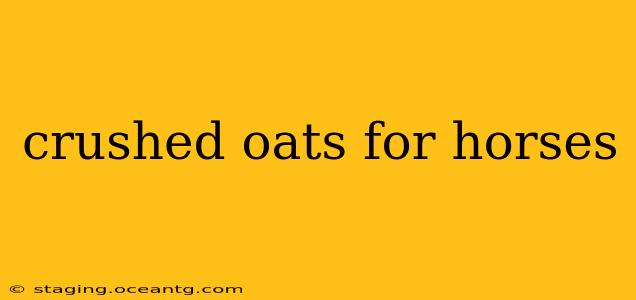Oats are a staple in many horse diets, providing valuable energy and nutrients. However, whole oats can be difficult for some horses to digest fully. This is where crushed oats come in, offering a potentially superior alternative for certain equine companions. This comprehensive guide will delve into the benefits, proper feeding methods, and potential drawbacks of feeding crushed oats to horses.
What are the benefits of feeding crushed oats to horses?
Crushing oats increases the surface area available for digestive enzymes to work on, leading to improved digestibility compared to whole oats. This means more energy and nutrients are absorbed, potentially resulting in:
- Improved Energy Levels: The enhanced digestibility translates to a more readily available energy source, beneficial for horses needing extra stamina, particularly working horses or those in active training.
- Better Weight Gain: For horses that are underweight or need to gain condition, the improved absorption of nutrients from crushed oats can contribute to healthy weight gain.
- Reduced Risk of Colic: While not a guaranteed preventative, better digestion can potentially lessen the risk of colic, a serious and potentially life-threatening condition in horses. This is because undigested whole oats can ferment in the gut and contribute to colic.
How much crushed oats should I feed my horse?
The amount of crushed oats you should feed your horse depends on several factors, including:
- The horse's age, weight, and activity level: A young, growing horse will have different energy requirements than an older, less active horse.
- The overall diet: Crushed oats should be part of a balanced diet, not the sole feed source. Other necessary components include hay, forage, and potentially other supplements depending on individual needs.
- Your horse's metabolic needs and health status: Consult your veterinarian to determine the appropriate amount of crushed oats for your horse's unique circumstances.
It's crucial to introduce crushed oats gradually to avoid digestive upset. Start with a small amount and increase it gradually over several days to weeks. Monitor your horse's manure and overall health for any signs of digestive issues.
What are the potential drawbacks of feeding crushed oats to horses?
While crushed oats offer benefits, there are some potential drawbacks to consider:
- Increased Risk of Laminitis (in susceptible horses): Horses prone to laminitis, a painful and debilitating condition affecting the hooves, may be more susceptible to this condition with high-starch diets, including large quantities of crushed oats.
- Potential for Weight Gain: The higher digestibility can lead to weight gain if the amount fed isn't carefully managed. Regular weight monitoring is crucial.
- Cost: Crushed oats can be more expensive than whole oats.
Are there any alternatives to crushed oats?
Yes, there are various alternatives to crushed oats, depending on your horse's needs and dietary requirements. These include other grains like barley, corn, or different types of feed formulated to provide specific nutrients. Always consult with your veterinarian or an equine nutritionist to determine the best feed choices for your horse.
Can I feed my horse crushed oats if they have metabolic problems?
Feeding crushed oats to horses with metabolic problems like Equine Metabolic Syndrome (EMS) or Cushing's disease requires careful consideration. These conditions often involve insulin resistance and can be exacerbated by high-starch feeds like oats. In these cases, your veterinarian or equine nutritionist will likely recommend a low-starch, high-fiber diet.
How do I store crushed oats properly?
Proper storage is vital to maintain the quality and prevent spoilage. Store crushed oats in a cool, dry, and well-ventilated area in airtight containers, protecting them from moisture, pests, and rodents.
What are the differences between whole oats and crushed oats?
The main difference lies in the processing. Whole oats require more chewing and digestion, while crushing increases the surface area for quicker digestion. This affects energy availability and nutrient absorption.
This guide provides a comprehensive overview of crushed oats for horses. Remember, every horse is an individual, and their dietary needs can vary. Always consult with your veterinarian or an equine nutritionist to create a safe and effective feeding plan tailored to your horse's specific requirements and health status. They can help you determine the best way to incorporate crushed oats, or alternative feeds, into your horse's diet to ensure optimal health and well-being.
